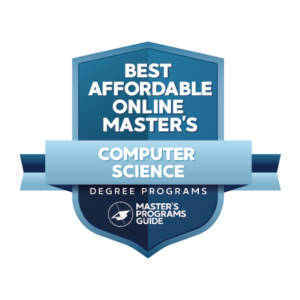Ready to find your ideal master's program?
www.mastersprogramsguide.com is an advertising-supported site. Featured or trusted partner programs and all school search, finder, or match results are for schools that compensate us. This compensation does not influence our school rankings, resource guides, or other editorially-independent information published on this site.
What would you do if someone told you that you could make a six-figure annual salary—or close to it—all by playing on your computer?
You would probably laugh in their face, but the reality is that there is one degree that can open up the doors to a career that is financially lucrative and personally rewarding. That degree is a master’s in computer science.
Whether you choose to become a computer programmer, a software developer, a systems analyst, or a database administrator, a degree in computer science will open up hundreds of doors for you.
Computer science majors are in demand by large companies and start-ups all over the country. You could work for a company as large as Spotify or Facebook, or you could work from home, tinkering on your own up-and-coming computer-based project. In fact, computer science majors are some of the most likely people to work from home.
Your likelihood of staying employed is high, too. These jobs are expected to grow 12% by 2028, with an average salary of more than $86,000. A computer science major will allow you to build new technologies that are shaping the world and being used by billions of people—and you’ll get paid handsomely for doing it, too.
One of the best ways to get a leg up on the industry is to continue your studies past the baccalaureate level and earn a master’s degree in computer science. Computer science is a hands-on discipline. A graduate degree will give you the opportunity to pursue specific areas of interest—like software development or video game design—that you may not have had the chance to delve into during your undergraduate studies.
Once you earn a master’s degree in computer science, you will no longer have to worry about “hitting a wall” in your professional career. You’ll be able to skyrocket your career to any level. Interested in senior management? Want to teach a few classes? A master’s in computer science will allow you to pursue those goals.
Let’s not overlook the broader career potential that a master’s degree presents, either. According to a recent White House report, there are more than 1.4 million computer science jobs available as of 2020—and only 400,000 qualified professionals to fill them. Without a doubt, a master’s in computer science is worth the investment.
The idea of that investment can be daunting, though, especially when the average total cost to attend graduate school is between $30,000 and $120,000.
Rest assured—you don’t have to spend a fortune in order to get a good education. In fact, there are dozens of quality online programs in computer science that will not only allow you to pursue your passions while working from home but do so debt-free, too.
There is no longer a stigma associated with online learning, either. In fact, more employers are not only accepting but encouraging their students to earn online master’s degrees, recognizing the benefit that having this kind of degree presents.
Common Application and Admission Questions
The beauty of an online master’s in computer science is that it is a flexible option for individuals who are already working in the field. That’s good news, since working in computer science often requires you to work long hours, some of which may not fall into a traditional 9-5 work schedule.
However, it’s important that you take and make the time to put together a solid application. Although there is a shortage of qualified computer science professionals in the United States, master’s degrees in computer science can still be quite competitive.
Admissions requirements for various online master’s in computer science differ a bit from each other, but in general, a college is going to seek the applicants with the most compelling reasons to admit them. You will need to submit an online application by a certain deadline. While some online schools admit computer science majors twice each year, once in the fall and once in the spring, some only open up admissions once, in the fall.
In most cases, you will need a minimum of a 3.0 GPA on a 4.0 scale, as evidenced by the submission of official transcripts from all the schools you have already attended. Some universities are even more stringent, requiring a 3.5 or even a 3.7 GPA on a 4.0 scale. However, if your GPA isn’t quite up to snuff, don’t be deterred from applying. You may be able to make up for this shortcoming by showcasing your capabilities in other aspects of the application.
When the college admissions department is evaluating your application, they will likely look the most closely at your grades in classes related to computer science, mathematics, and other technical areas. However, your grades will be evaluated as a whole across the board, too.
You will likely be asked to submit scores from the GRE examination. Again, minimum scores vary by the institution (and some don’t even require them at all) but expect to submit scores showcasing at least 153 in the verbal, 155 in the quantitative, and 3.0 in the analytical sections of the exam.
If you are applying from outside of the United States, you will likely be required to submit scores from the Test of English as a Foreign Language (TOEFL) examination, too. This will be necessary if you are from a non-English speaking country and you have not already studied in the United States.
You’ll need to submit some supplemental documentation in most cases, too. Supplemental materials will show what kind of student you are outside of the classroom, and this part of the application can be especially helpful if you have any academic weaknesses. You’ll want to brush up your resume or CV to show strong professional experience.
You may also need to supply a professional motivation essay, which you can use to illustrate your personal and professional goals. Letters of recommendation from former instructors and employers who know you well may also be required to round out your application, too.
What About Financial Aid & Scholarships?
No bones about it—earning a master’s in computer science can be expensive. Top-tier programs can cost upwards of $120,000! Public universities tend to be less expensive, but that’s not always the case. While you will earn a higher than average starting salary once you earn a master’s in computer science, it’s important that you research all of the potential options for financing your education without reaching into your own pocket first.
After all, wouldn’t it be nice to be able to save and invest that money instead of spending it on textbooks?
Most universities offer significant amounts of financial aid and scholarships to help offset the cost of attendance. Although master’s degrees are traditionally accompanied by lower amounts of financial aid than undergraduate programs, there’s still the potential to have a significant amount of your college expenses paid by someone else besides yourself.
Again, public schools tend to cost less than private schools, but according to the National Center for Education Statistics, a graduate program will cost up to $25,000 per year to attend. Research the financial aid opportunities offered by your school, because some private schools end up being cheaper than public ones after financial aid is taken into account.
Fill out the FAFSA (the Free Application for Federal Student Aid) as soon as possible. This document can be accessed starting in January in the year in which you intend to enroll. Even if you don’t plan on starting classes until August, you need to fill this form out as soon as possible. This will make you eligible for any need-based aid your school has to offer, including federal and state grants, work-study, and public loans.
This is a great place to start, but unfortunately, the FAFSA usually only opens up need-based financial aid. If you, your parent, or your partner (depending on your age and status) are already working, you may not be able to evince a high level of financial need.
However, most universities also offer specialty or merit-based awards. These generally do not have to be repaid and are based on non-financial qualifiers, such as your grades or personal accomplishments. These are sometimes automatically awarded based on the strength of your application, but you may have to submit a supplemental application, too.
This is why it’s so important to keep yourself apprised of any deadlines! Do your research ahead of time so you know exactly what your university offers and how you can make yourself the most qualified candidate.
If your school doesn’t offer much for computer science majors, don’t despair. It might be worth your time to look into industry scholarships, too. There are plenty of third-party organizations—and potentially even your own employer—that might offer incentives for you to go back to school for your master’s.
Exhaust all of these opportunities, and whatever you do, don’t leave free money on the table!
How Much Can I Make With a Master’s in Computer Science?
This is a question that’s asked by many aspiring computer science majors. It’s a valid question, and you’ll probably love the answer.
Graduates with master’s degrees tend to earn at least 18% more over the course of their lifetimes. A graduate degree brings with it a dramatic increase in pay. Plus, the average salary for computer science professionals is $114,000, according to Northeastern University, with top-paying jobs held by master’s degree holders.
Some of the highest-earning titles? Software development engineers, with salaries of $116,679, and computer scientists, with averages salaries of $113,180. Even the lowest-paying jobs, like computer programming, still haul in mean annual wages of $87,000 or more.
Other high-paying jobs to consider include senior software web developers, mobile application developers, security engineers, and UNIX system administrators. Positions that offer some level of autonomy over your work—or leadership over others—will generally pay more, too.
There are plenty of ways to increase your earning potential while you are enrolled in a graduate program in computer science. First, make sure you are taking classes that are relevant to your desired field of work; if you want to become a software engineer, you should take classes in areas like object-oriented design.
Most master’s degrees include a final culminating project, such as a capstone or final thesis. When you complete your final project, make sure it aligns with your ultimate career goals. If you’re not sure what those goals are, that’s ok—but if you know you want to enter into a specific line of work or pursue a certain area of research, take the opportunity with your capstone project to do it.
Not only will this kind of laser-focused precision show your future employer that you have what it takes to be successful, but it will help you pursue a topic that will enhance your skills and broaden your professional network.
Another tip is to take any and all opportunities for professional development. While many master’s degrees in computer science require candidates to complete work experience hours, not all do. Even if your program is one of those that does not have this requirement, take the initiative to get some hands-on experience.
Learning by doing is one of the best ways to solidify your skills. Even if you have to engage in unpaid internships, the small sacrifice is often worth the reward. You’ll not only gain relevant workplace skills but you’ll show potential employers that you’re serious about the industry. Many unpaid internships also lead to full-time jobs after graduation—many of which offer lucrative pay—so it’s well-worth the investment.
It’s also important to look at all of the non-monetary benefits of earning a master’s in computer science, too. Not only will you be more likely to get a job—a recent survey by Careerbuilder showed that nearly 74% of employers have raised their educational standards—but you’ll broaden your professional network, too.
What Are the Best Online Master’s in Computer Science Degrees?
We know that you have educational goals that you’re itching to pursue, but you may not know where to start. The editors of Master’s Programs Guide utilize a unique ranking methodology based on the following five aspects:
25% Overall Degree Affordability: Average cost of undergraduate and graduate tuition per school
25% Graduation Rate: Number of students who start at the university and actually finish there
20% Earnings Potential: Average mid-career salary of school alumni
20% Selectivity: The number of students who apply versus the number who actually get accepted
10% Online Graduate Offerings: The number of programs offered online in each department
At Master’s Programs Guide, we strive to do our best to guide you and your family toward a fruitful academic career. The pursuit of knowledge is a noble one, and we want to help you reach your goals.
#1. Georgia Institute of Technology
Online Master of Science in Computer Science
With campuses in Savannah, GA along with China, Singapore, Ireland, and France, Georgia Institute of Technology—or “Georgia Tech”—has an international reputation with a small-town feel. Once a small trade school, the university has evolved to be one of the world’s most prominent technical universities and top research institutions. It’s not all work here, though. Georgia Tech has some of the country’s best sports teams where the “Yellow Jackets” compete regularly in the Coastal Division of the Atlantic Coast Conference.
The Master of Science in computer science at Georgia Institute of Technology was developed in 2014 in a partnership with Udacity and AT&T. This degree can be earned exclusively online and is offered at a small percentage of the cost of traditional on-campus programs. The program brings together top leaders in industry and education and has enrolled more than 10,000 students to date.
The degree is identical to the on-campus program and allows students to collaborate extensively in their courses. Not only will students be able to complete all of their required courses online, but they can explore job opportunities, gain academic support, and form professional networks, too.
Specializations are offered in interactive intelligence, machine learning, computing systems, and computational perception and robotics. The degree consists of 30 credit hours, or ten courses. Sample classes include Advanced Operating Systems, Software Analysis, Educational Technology, and Computer Vision, just to name a few.
The curriculum boasts more than 28 courses and is home to a diverse student body with students from more than 100 cultures. The degree also represents more than 3000 companies, showcasing the reach that this program has when it comes to industry influence.
Offered by the Georgia Tech College of Computing, this degree is one of many research-oriented degrees that offer real-world applicability. All students have access to an exclusive College of Computing career development team that works hard to help students reach their goals. This office connects students with work abroad, job opportunities at major organizations and even startups, and access to internships, co-ops, and more.
The department is home to multiple student organizations, too, including the Big Data Big Impact Club, the Design Club, the Programing Team, and more. These opportunities are offered on-campus and many are also available to distance learners, too.
To apply, you will need to have a cumulative GPA of at least 3.0 or higher, and a four-year bachelor’s degree from a regionally accredited university. Applications are accepted year-round, with no summer admissions. You’ll need to submit a detailed general application form along with an essay on your background and career objectives.
All applicants will also need to submit a resume and a statement of purpose. You will need to provide recommendations from two individuals who know you well, too.
#2. East Carolina University
Master of Science in Computer Science
You will have plenty to enjoy outside of the classroom if you choose to study at East Carolina University. This school is home to eleven social sororities, four historically Black sororities, sixteen social fraternities, five historically Black fraternities, and two Native American fraternities/sororities. With more than 400 registered clubs on campus to add to that long list of activities, it’s hard to believe ECU could be about anything more than having a great college experience.
But it is. In fact, Eastern Carolina has one of the country’s best Master of Science in computer science degrees. It is designed to prepare students who wish to work in academia or in the private sector. It’s perfect for aspiring computer programmers, designers, software engineers, web developers, and more.
The curriculum covers the practice and theory of hardware construction and software design. It also includes applicable programming languages like C# along with database environments, software engineering tools, and operating systems.
You will need to take a minimum of 30 to 38 credit hours of study. Core classes include Machine Learning and Design and Analysis of Algorithms. After completing your main coursework, you’ll be able to choose from a traditional and a non-traditional pathway. In the traditional pathway, you can choose between completing a coursework-only program, a thesis, or a project-based assessment.
In the non-traditional pathway, you’ll take more classes along with two bridge courses and a few other fundamental classes. You will also be able to choose between a thesis, project or coursework-only option. For both of these pathways, selecting the coursework-only pathway will require you to complete an e-Portfolio assessment before graduation.
Choose the research pathway, and you will be well-equipped with the skills you need to pursue a career in academia or to continue on to doctoral study. You’ll be able to design and conduct your own research project and written report, the topic of which is your own choosing.
To apply, you will need to submit satisfactory undergraduate grades along with scores from either the Graduate Record Examination or the Miller Analogies Test. You will also need several letters of recommendation. The program requires a background in electrical engineering, computer engineering, computer science, software engineering, information systems, or a related major. Significant financial aid is available for students who qualify.
There are plenty of reasons to consider studying at Eastern Carolina University. Not only was it ranked in The Princeton Review’s 2020 Best 385 Colleges list, but it’s also within the top 25% of all graduate programs according to the U.S. News & World Report, too. Home to the “Pirates,” this large online school has some of the best resources to offer its dedicated online learners.
#3. Colorado State University-Fort Collins
Master of Science in Computer Science (M.C.S.)
The flagship university of the Colorado State University system, Colorado State University-Fort Collins is a public research and land grant university located in scenic Fort Collins, CO. Although the school spends upwards of $330 million each year on research and development, it’s not all about the academics here. In fact, there are more than 325 student organizations and 30 sports clubs on campus. Three hundred different artistic, musical, and theatrical performances take place on campus each year, too.
You don’t have to be studying on campus to benefit from all of these activities, either. There are plenty of extracurricular opportunities and educational resources for online learners, too, all of which can be accessed via You@CSU. Not only will you be able to enjoy free online writing consultations, but the Office of Adult Learner and Veteran Services offers regular resources like scholarships for military-affiliated students.
You’ll have full access to IT Support, the Morgan Library, and the Career Center online, too. The online master’s in computer science is offered by one of the country’s leading renowned research institutions and provides learners with the training necessary to meet growing demand. It’s a well-rounded program that combines core concepts in science, mathematics, and engineering. This gives learners a comprehensive perspective when it comes to solving software challenges that may arise.
A coursework-only degree, this program provides learners with valuable professional and practical experience in applicable skills like network security, data structures, algorithms, and software testing and design. It offers learners a chance to improve their job prospects, too, through connecting them with ample employment opportunities both locally and abroad.
In fact, about 70% of all CSU computer science graduates have job offers upon graduation. Students go on to work at major software, tech, and aerospace companies, including Intel, Hewlett-Packard, Microsoft, IBM, and more. Through this program, learners will be able to collaborate with other like-minded and diverse professionals as they work on projects in this self-paced degree.
The curriculum includes a minimum of 35 semester credits. Twenty-four must of these must be completed at CSU, while the rest can be transferred from another university. Core classes including Artificial Intelligence, Computer Security, Fault-Tolerant Computing, and 3D User Interfaces, just to name a few. During all of your classes, you’ll be supported by regular interactions with faculty, staff, and fellow students.
If you wish to continue your education even further, it’s important to note that CSU also has a computer information system certificate. Both this certificate and the master’s degree are identical to their counterpart programs offered on campus in Fort Collins, CO. Study online, and you’ll enjoy the flexibility of earning the degree you want without the pressures of a strict schedule. You can complete the degree in as little as two years, but you can take multiple years if necessary, too.
Tuition starts at just $715 per credit hour. To apply, you’ll need to submit an online application along with optional but recommended test scores. You will also need transcripts, a resume, letters of recommendation, and a statement of purpose.
#4. North Carolina State University at Raleigh
Master of Computer Science
Founded in 1887, North Carolina State University at Raleigh is often referred to simply as “State.” A name like that bears some serious weight. With more than 35,000 students studying both online and on-campus and with master’s degrees in more than a hundred different fields, “State” has a motto of “Think and do” that extends to all of its physical and virtual programmatic offerings.
The master’s degree in computer science is taught by a nationally recognized faculty of roughly 40 tenure-track professors along with a handful of qualified visiting lecturers and adjunct professors. Most of these have extensive experience in industry and nearly two dozen are recipients of the National Science Foundation’s prestigious CAREER Award.
Ths world-class program is considered a terminal professional degree and is perfect for working professionals. It requires no comprehensive examination or thesis and consists of online coursework only. It’s perfect for military personnel serving abroad, as most students only take one or two classes each semester.
All classes are offered via streaming video from the Internet. Students are able to react fully with fellow students and instructors, with most courses existing as recorded versions of their on-campus counterparts. The degree is designed for students who already have an undergraduate degree in computer science and consists of 31 credit hours.
To be eligible for admission, students should have taken undergraduate courses in topics like computer science, calculus, statistics, probability, and differential and integral calculus. A minimum GPA of 3.0 on a 4.0 scale is required, as is completion of the general Graduate Record Exam.
Although some students will complete their degree requirements for this program in as little as two years, candidates may take up to six years if necessary. Core classes include Computational Applied Logic, Architecture of Parallel Computers, and Principles of Computer Graphics, just to name a few.
The degree prepares learners for a variety of job prospects, including those as computer programmers, IT directors, Java architects, data engineers, and more. The degree is offered via the College of Engineering in conjunction with the Office of Online and Distance Education. The program offers the utmost schedule flexibility with internationally respected credentials.
In fact, North Carolina State University is ranked as the top North Carolina university in respect to the quality of its educational programs and affordability. It’s the best value in higher education and offers exemplary student support.
Not only do students have access to extensive enrollment advice but they’ll also receive academic support in the form of intensive faculty mentoring. You’ll get technical support over email, phone, or person-to-person contact, too. With more than 100 programs offered online, North Carolina State University knows what it takes to make online learning run smoothly, and its programs are some of the best.
#5. Frostburg State University
Master of Science-Applied Computer Science
Frostburg State University has a motto that proclaims, “One university. A world of experiences.” This public school, located in Frostburg, MD, brings that message home each and every day in its diverse program offerings. Not only does the school place a primary emphasis on its role as a teaching and learning institution on-campus, but these offerings are extended to online learners, too.
The Master of Science in applied computer science at Frostburg State is a theory-and practice-based program that is more experiential in nature than many of its counterparts. Not only will it prepare you for exciting opportunities in fields like government and network security, but it will do so in a hands-on way.
In this program, you can specialize in a variety of fields. Options for concentrations include database and general. You’ll take ten online courses requiring 30 credit hours of study. Basic required courses include Advanced Data Structures and Algorithms, Web Development and Programming I and II, and Software Engineering. Once you finish your concentration, you’ll be able to complete a master research project or paper, too, to further hone your skills.
This program is identical to the one offered on campus and allows you to work on addressing real-life computer science challenges that are faced by actual government agencies and businesses. You can enter the program with absolutely no background in computer science—you will just have to take two classes to make up for the deficit.
If you already have a computer science degree from Frostburg, you can earn this degree in just one year. You’ll simply take two graduate courses during the senior year of your undergraduate study.
This program can be tailored to your professional aspirations and background, even if you have no relevant undergraduate study. It can be pursued on either a full- or part-time basis. When you’re close to graduation, you can either complete a thesis in applied computer science or choose an elective course.
Multiple graduate assistantships are available each year for students who are interested in teaching, completing projects, or engaging in research studies. There are other ways for students to get involved on campus, too, including through the campus chapter of the Association of Computer Machinery. Membership in this organization allows learners to get access to the latest resources in computer science.
The computer science program at Frostburg State has some of the best career outcomes we’ve seen. Alumni work at a variety of prestigious technical companies, including Boeing, Google, Apple, IBM, Lockheed Martin, and more. You’ll gain the skills necessary for your career by studying in state-of-the-art computer labs and learning from top educational leaders in the field.
Class sizes are small, so you’ll get to know your professors and classmates well. Your instructors will be able to use this knowledge to mentor you toward the career of your dreams. To apply, you will need to submit a completed application for admission along with official transcripts from all previous graduate and undergraduate work.
#6. Charleston Southern University
Master of Science in Computer Science
Chartered in 1960, Charleston Southern University first opened its doors as the Baptist College of Charleston. The school offered its first classes in the First Baptist Church of North Charleston, educating just a handful of students before it awarded its first degrees in 1967. Today, the school remains small, home to only 3,600 on-campus and online students.
Despite its small size, Charleston Southern offers some of the best online programs. The Master of Science in computer science is nationally renowned for its academic excellence. The curriculum provides learners with advanced training in the technical fundamentals of the discipline, including software engineering, database, networking, and architecture engineering.
There are pathways available for students interested in both thesis- and non-thesis- programs of study. For the thesis track, you’ll be expected to take 33 hours of credit, in which you’ll take a limited number of electives. For the non-thesis track, you can take a larger number of electives and will not complete a thesis.
Core courses include Advanced Algorithms, Distributed Database Systems, Software Testing and Maintenance, and Advanced Computer Networks. You’ll also take classes like Network Penetration, Testing, and Ethical Hacking. Offered by the College of Science and Mathematics, this program is taught by faculty who are available and easy to approach.
In this program, you’ll not only take classes in the basic theories of computer science, but you’ll also be able to demonstrate your skills in hands-on work. You’ll learn cloud computing platforms like AWS along with cybersecurity practices. You’ll be able to engage in hands-on projects to gain skills that you can immediately apply to your job.
Not only that, but you’ll gain access to all campus-based and online resources, including labs, classrooms, an auditorium, and more. All faculty are available for remote communications so you can ask any questions you have and get support while you are working on your assignments.
The significant aspect is that all courses are taught from a unique Christian worldview. Learners will uncover new ways to not only use their newfound skills in computer science but to do so in an ethical way. Courses are offered in a flexible learning format, both in-person as well as online. Tuition is affordable, starting at just $500 per credit hour.
This degree can be completed on both a full- and part-time basis. Completed full-time, it takes most students about 12 months to complete. When completed part-time, you can take up to 26 months to complete your degree.
To be eligible for admission, you will need to submit a completed application along with an application fee. You’ll need to have taken the Graduate Record Examination (GRE) within the last five years. If you haven’t taken the examinations, you can be exempted from the requirement with a GPA of 3.5 or higher.
You will also need to supply a personal letter of work experience that is no more than 500 words in length and details your career and academic goals. Two letters of recommendation are required, too.
#7. University of Illinois at Urbana-Champaign
Online Master of Computer Science
The name sure is a mouthful, but the mission of the University of Illinois at Urbana-Champaign is simple: Learning and labor. This motto is carried through and maintained throughout all of this school’s more than 250 courses of study.
Although the university is classified as a R1 Doctoral Research University under the Carnegie Classification of Institutions of Higher Education, a lofty designation that indicates high research activity on campus, online learners have the opportunity to participate in research, cooperative learning experiences, internships, and more, too.
The master’s in computer science is offered via Coursera, which has a dynamic online open course platform that delivers classes in a convenient, flexible, and affordable way. You can earn your degree in as little as one year or take as long as five years to finish your studies. With a student-to-faculty ratio of just 20:1, there’s no reason not to give this university some consideration for your graduate studies.
The program is a non-thesis, coursework-only degree. You’ll complete 32 credit hours of study via eight graduate-level classes. While four of these classes should be from unique core areas, the rest can be taken at the advanced graduate level. Coursework is available in areas like high-performance computing, scientific computing, human-computer interaction, artificial intelligence, software engineering, databases, and more.
The computer science program at the University of Illinois is highly affordable, with tuition starting at just $670 per credit hour. Although research or teaching assistantships aren’t offered to online students, you may be eligible for significant amounts of financial aid. Close to half of all undergraduate students receive financial aid, in fact.
Graduates from this department have an annual salary of more than $99,000, which is significantly higher than the national average. You don’t have to have graduated in order to appreciate what this university has to offer, either. The average freshman retention rate, which is a strong indicator of student satisfaction, sits at 93%.
The Department of Computer Science at the University of Illinois at Urbana-Champaign is highly ranked in regard to both its graduate and undergraduate programs. It is home to more than 80 full-time faculty members, 32 of whom are NSF CAREER Award Winners and responsible for major industry collaborations. The university offers significant resources to students studying both online and on-campus, including placement services, nonremedial tutoring, and more.
Ready to apply? Doing so is easy. First, you must hold a four-year bachelor’s degree. It can be in a field besides computer science, but you must take a few required classes in subjects like data structures and linear algebra in order to be prepared for your graduate courses. You should have a GPA of at least 3.2 on a 4.0 scale.
Letters of recommendation are not required but can be used to support your application. GRE scores are also not required.
#8. University of West Florida
Master of Science in Computer Science
At the University of West Florida, located in Pensacola, FL, the mascot is an argonaut. Building on that imagery, the logo for the school is the chambered nautilus. Not everything at the university is about ocean life, though. This school has some of the best programs in technology and computer science and is also one of the country’s finest space-grant institutions.
The Master of Science in computer science at the University of West Florida is not only one of the best in terms of academic quality, but it’s also one of the most innovative. It will provide you with the skills you need to become—and to stay—competitive in the fast-paced world of computer science. You’ll combine basic foundational skills with contemporary subjects in computer science and technology.
The degree covers advanced topics in things like parallel computing, artificial intelligence, algorithmic programming, and data analytics. You will learn more about machine learning or decision support and you’ll cover parallel programming along with high performance computing.
With small class sizes, the program offers the opportunity to interact with and gain individualized attention with directed research faculty. You don’t miss out because you’re studying online, either. Instead, you’ll benefit from the flexibility of a curriculum that allows you to study entirely at your own pace.
The degree is a perfect choice for learners who have a background in information technology, computer science, or a related field. You’ll complete 30 total credit hours including 15 in core computer science topics. You can customize your degree with a concentration in data analytics or software engineering, too.
Plus, there are plenty of opportunities to pursue electives. You can take classes like Software Design, Advanced Programming Languages, or even Advanced Computer Systems and Networks to enhance your learning and make the learning process more enjoyable and interesting, too.
The degree is affordable, with tuition starting at just $425 per credit hour. You can submit up to six transfer credits to help you save money, too. The University of West Florida is a proud participant of the Yellow Ribbon Program, which provides free tuition with military benefits to qualified active duty and veteran military members.
Other financial aid is available too, including scholarships, grants, and loans. When you apply, you’ll be supported by reassuring and informative admissions and financial aid staff. That support will carry you throughout your entire degree.
You’ll get individualized attention and access to resources including tutoring services, databases, online journals, a writing lab, technical support, and more. The university has an impressive student-to-faculty ratio of just 21:1, with many online classes featuring even smaller cohorts.
To apply, you will need to have a minimum cumulative GPA of 3.0 on a 4.0 scale. You should submit official transcripts from all institutions you have attended along with contact information for two professional references. You will also need to supply a resume and a letter of intent that describes your work experience and career goals.
#9. Dakota State University
Master of Science in Computer Science
At Dakota State University, computer science majors will enjoy the motto emblazoned on every piece of the school’s decor— “Embrace innovation.” Here, creative, out-of-the-box thinking is valued like nothing else, and programs like computer information systems, computer management, and education are prized as the most popular degrees.
Home to just 3,307 students, Dakota State ensures that all students have access to hands-on, relevant career training and academic programming. The Master of Science in computer science is a far cry from the traditional computer science program. Not only does the school have vital connections to the International Space Station, but the programs are incredibly hands-on, too.
At Dakota State University, you will work closely with talented faculty members who are active researchers and practitioners themselves. You’ll be able to assist these faculty in research as you discover your own goals and career path. Faculty frequently become valuable mentors to students as they move through the curriculum.
You’ll build upon the basic foundational and theoretical aspects of computer systems and computability while also dealing with market-based areas of computer science, such as cyber security. You will refine your skills in troubleshooting and coding, too, learning how to solve common and novel problems in computer science with design algorithms and computational analogues.
Class sizes are small and individualized, but you don’t have to pay a premium to enjoy that kind of attention. Tuition is affordable and classes are offered in a convenient format, with courses offered year-round.
You will start by taking five required core courses. Then, you can take five additional courses in an area of interest along with a specialization in cyber operations or approved electives that match your career goals. You’ll complete all of this coursework by learning under the best minds in the business.
The degree is a perfect step for students interested in jumping right into the workforce, but it’s also a good option if you are interested in pursuing the university’s Doctorate of Philosophy in cyber operations. You will be supported by a variety of resources here, including the campus’s newest facility, the Beacon Institute of Technology.
This institute is home to smart classrooms, places for tech collaboration, and cutting-edge labels. Many of these resources are also offered to remote learners, too. Dakota State is recognized by the National Security Agency as a national leader in cyber security, so you can expect to take a number of hands-on classes in this discipline, too.
Not sure this program is right for you? Dakota State also has related programs such as the Master of Science in cyber defense, the Master of Science in analytics, and the Master of Science in information systems. No matter which path you choose, rest assured that you’ll be supported by attentive, qualified faculty and a diverse group of peers.
Dakota State University is not only recognized as one of the country’s Top Public Schools, but it’s ranked as one of the best Regional Universities in the Midwest, too. That’s according to the 2020 rankings by the U.S. News & World Report.
#10. University of West Georgia
Online MS in Applied Computer Science
A member of the NCAA Division II Gulf South Conference, the University of West Georgia is known for its excellence on the athletic fields as the “Wolves.” The school has a variety of competitive sports teams in athletics like baseball, cross country, football, and more. However, it’s not all fun and games at UWG. The school also has some of the finest academic programs—most notably, several offerings in computer science.
The Master of Science in applied computer science is offered 100% online by the College of Science and Mathematics. A student-centered department, the college emphasizes hands-on learning and brings that learning outside of the classroom whenever possible. The school is ranked as one of the top National Universities by U.S. News & World Report, with an average student-to-faculty ratio of just 19:1.
This degree is not only convenient, but it’s also affordable and high-quality, too. It provides learners with the skills and knowledge they need to pursue rewarding careers as software developers.
You can take two classes per semester with six credit hours each, which will allow you to complete your studies in just two years. The curriculum is practical and focused, enabling you to enter the information technology job market immediately upon graduation.
You’ll take classes in areas like program construction, web technologies, advanced tools and techniques, database systems, and more. Plus, you’ll round out your learning with a final project that will allow you to bring together all the skills and knowledge you’ve acquired. While most of your coursework will be done on your own, you will also need to participate occasionally in online group meetings.
The program is highly affordable, with tuition coming in at just under $2,900 per semester. Financial aid and scholarships are available. In fact, the average scholarship or grant is more than $5,000 per student. That’s just one resource offered to online learners, but there are plenty of others worth mentioning, too.
For starters, you’ll have access to the Computer Science eXperience (csX) Lab. Here, you’ll receive online and face-to-face assistance with laboratory assignments for various computer science courses. You will also have access to computing labs and collaboration spaces along with career placement services, health services, and more.
To apply, you will need to have an undergraduate GPA of at least 2.75 on a 4.0 scale. In addition to your general application, you will also need to submit three recommendation letters for professional references, a comprehensive resume, and an essay that explains your personal and professional reasons for pursuing the degree. GRE test scores are not required.
When you are admitted, you will enroll as part of a cohort that begins in the fall semester. However, applications are reviewed on a rolling, monthly basis. Although you won’t be able to begin your studies at any time, you will know pretty quickly after applying whether you were accepted or not.
OTHER NOTABLE PROGRAMS
#11. Capitol Technology University
Location: Laurel, MD
Degree: Master of Science (MS) in Computer Science
Net Price: $21,816
#12. University of Idaho
Location: Moscow, ID
Degree: M.S. Computer Science
Net Price: $15,061
#13. University of Massachusetts-Dartmouth
Location: Dartmouth, MA
Degree: MS in Computer Science Online
Net Price: $18,152
#14. Georgia Southern University
Location: Statesboro, GA
Degree: M.S. in Computer Science
Net Price: $15,435
#15. Columbus State University
Location: Columbus, GA
Degree: Master of Science in Applied Computer Science
Net Price: $11,316
#16. Georgia Southwestern State University
Location: Americus, GA
Degree: Master’s Degree in Computer Science
Net Price: $12,653
#17. Southern Arkansas University
Location: Magnolia, AR
Degree: Master of Computer and Information Science
Net Price: $13,203
#18. Arizona State University
Location: Phoenix, AZ
Degree: Online Master of Computer Science
Net Price: $13,731
#19. Old Dominion University
Location: Norfolk, VA
Degree: Master of Science in Computer Science
Net Price: $15,917
#20. University of Houston-Victoria
Location: Victoria, TX
Degree: Master of Science in Computer Science
Net Price: $10,458
#21. National University
Location: San Diego, CA
Degree: Master of Science in Computer Science
Net Price: $20,575
#22. University of Illinois at Springfield
Location: Springfield, IL
Degree: Computer Science Master’s Degree
Net Price: $10,733
#23. La Salle University
Location: Philadelphia, PA
Degree: Computer Information Science (M.S.)
Net Price: $24,473
#24. Lewis University
Location: Romeoville, IL
Degree: Online Master of Science in Computer Science
Net Price: $18,899
#25. University of Michigan-Dearborn
Location: Dearborn, MI
Degree: Master of Science in Computer and Information Science
Net Price: $10,533
#26. Purdue University
Location: West Lafayette, IN
Degree: Master’s in Computer Science
Net Price: $11,898
#27. University of Louisville
Location: Louisville, KY
Degree: Master of Science in Computer Science
Net Price: $17,098
#28. Davenport University
Location: Grand Rapids, MI
Degree: Master of Science in Computer Science
Net Price: $17,169
#29. James Madison University
Location: Harrisonburg, VA
Degree: Computer Science: Information Security
Net Price: $17,753
#30. University of Michigan-Flint
Location: Flint, MI
Degree: Computer Science and Information Systems (MS)
Net Price: $12,519
#31. University of Bridgeport
Location: Bridgeport, CT
Degree: Masters in Computer Science
Net Price: $23,326
#32. Franklin University
Location: Columbus, OH
Degree: M.S. Computer Science
Net Price: $18,684
#33. City University of Seattle
Location: Seattle, WA
Degree: Master of Science in Computer Science
Net Price: $20,567
#34. Colorado Technical University-Colorado Springs
Location: Colorado Springs, CO
Degree: Master of Science in Computer Science
Net Price: $15,478
#35. Sofia University
Location: Palo Alto, CA
Degree: Master of Science in Computer Science
Net Price: $22,000
IF YOU ENJOYED THAT THEN CHECK OUT OUR ARTICLES ON THE 50 HIGHEST PAYING MASTER’S DEGREES & 40 FASTEST ONLINE MASTER’S DEGREE PROGRAMS!










